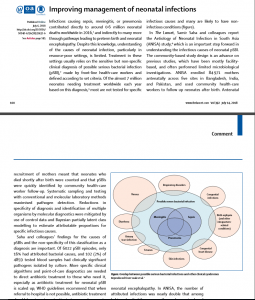
Infections causing sepsis, meningitis, or pneumonia contributed directly to around 0·6 million neonatal deaths worldwide in 2016, and indirectly to many more through pathways leading to preterm birth and neonatal encephalopathy. Despite this knowledge, understanding of the causes of neonatal infection, particularly in resource-poor settings, is limited. Treatment in these settings usually relies on the sensitive but non-specific clinical diagnosis of possible serious bacterial infection (pSBI), made by front-line health-care workers and defined according to set criteria.
This paper was awarded the prestigious CDC Charles C. Shepard Science award. Established in 1986, the CDC/ATSDR Charles C. Shepard Science Award was named in honor of Dr. Charles C. Shepard, M.D., the internationally recognized microbiologist who was chief of the Leprosy and Rickettsia Branch at CDC for more than 30 years, until his death on February 18, 1985. The Charles C. Shepard Science Award can be awarded both for scientific publications and for lifetime scientific achievement. For scientific publications, the award is presented to the best manuscript on original research published by a CDC or ATSDR scientist in a reputable, peer-reviewed journal. For lifetime scientific achievement, the award is given to an individual with a body of scientific work contributing to public health. In some years, the award may not be given in all categories.
Please find the related journal article “Causes and incidence of community-acquired serious infections among young children in south Asia (ANISA): an observational cohort study” here.